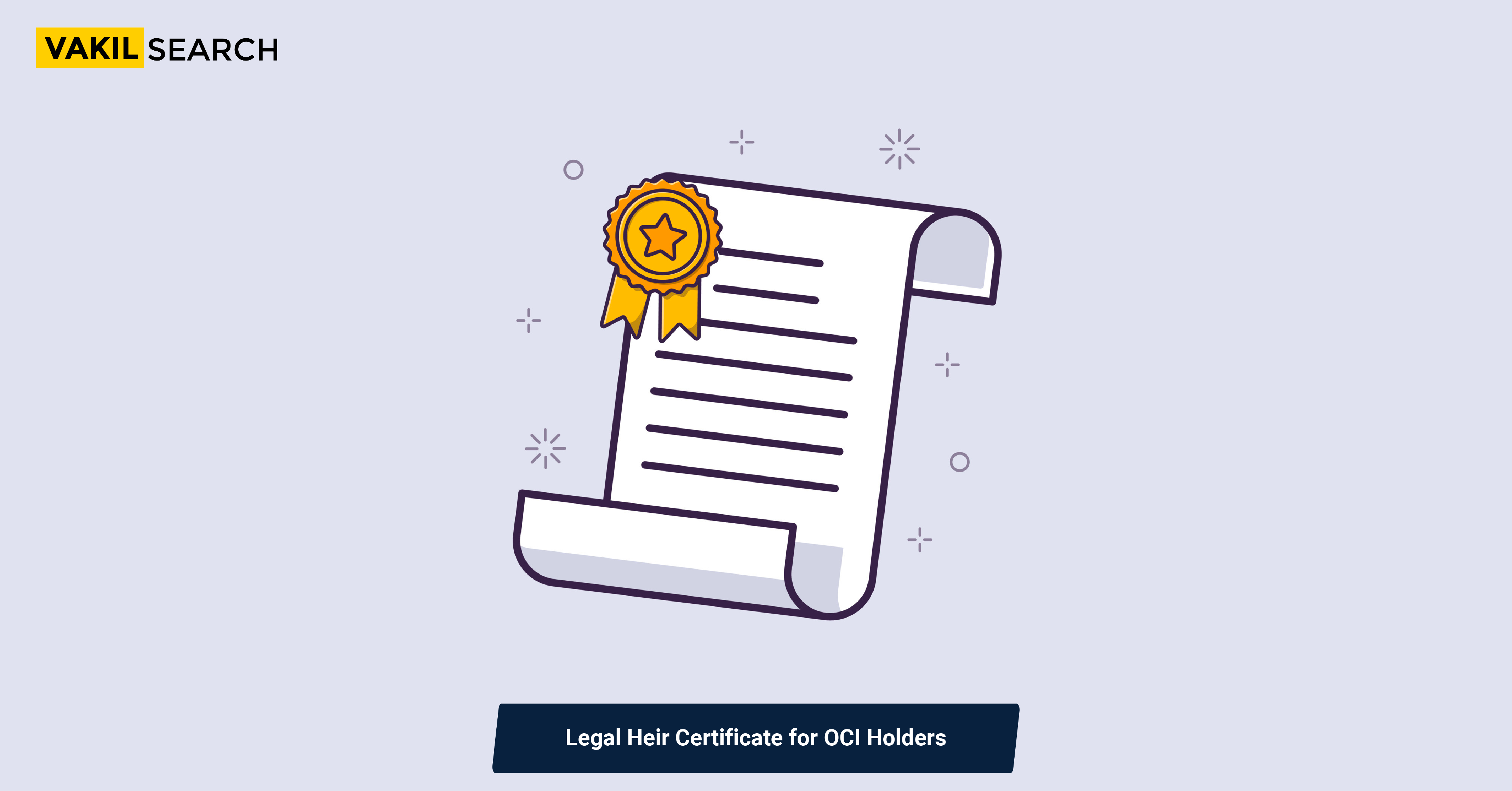Wondering about the process for OCI holders to obtain a legal heir certificate in India? Here’s everything you need to know.
For Overseas Citizen of India (OCI) holders, navigating the legal intricacies of India can be challenging, particularly when dealing with matters related to inheritance and property. Know more about Legal Heir Certificate for OCI Holders in this blog.
When a parent passes away in India, OCI holders often find themselves in the position of legal heirs, entitled to their deceased parent’s assets. However, to establish their legal claim and facilitate the transfer of these assets, OCI holders need a crucial document known as the “Legal Heir Certificate.”
In this comprehensive guide, we will walk you through the process of obtaining a Legal Heir Certificate in India as an OCI holder, the importance of this document, and how Vakilsearch’s services can simplify the process.
Understanding the Legal Heir Certificate
A Legal Heir Certificate, also known as a Succession Certificate, is a legal document issued by the court that establishes the rightful heirs of a deceased person. This certificate is essential for OCI holders who wish to inherit their parent’s assets, including property, bank accounts, and other possessions.
Why Is a Legal Heir Certificate Necessary for OCI Holders?
As an OCI holder, you may have the legal right to inherit your parent’s assets in India. However, without a Legal Heir Certificate, proving your legal claim and transferring these assets can be a complex and time-consuming process.
Here are some key reasons why a Legal Heir Certificate is crucial:
- Asset Transfer: A Legal Heir Certificate is required to transfer ownership of assets such as property, bank accounts, and investments in your name.
- Avoid Legal Disputes: It helps prevent potential disputes among family members regarding the distribution of assets.
- Financial Transactions: You may need the certificate to perform financial transactions on behalf of the deceased, such as closing bank accounts or selling property.
Steps to Obtain Legal Heir Certificate
Now, let’s delve into the step-by-step process for OCI holders to obtain a Legal Heir Certificate in India:
Step 1: Verify Documents
The first step involves gathering and verifying the necessary documents:
– Death Certificate: Obtain the death certificate of your deceased parent. This document serves as proof of their passing.
– Identity Proof: Provide your OCI card as proof of your status as an Overseas Citizen of India.
– Family Tree: Create a family tree that outlines the relationship between the deceased and the legal heirs (OCI holders).
Step 2: Approach the Local Court
OCI holders can approach the local authority with jurisdiction over the area where their deceased parent lived or owned assets. The court will typically be a District Court or a Sub-Divisional Magistrate Court.
Step 3: File an Application
Submit an application for a Legal Heir Certificate to the respective court. Include all the verified documents, such as the death certificate, your OCI card, and the family tree.
Step 4: Legal Notices and Hearing
After receiving your application, the court will issue legal notices to all legal heirs mentioned in your application. This step allows any other potential claimants to come forward and assert their rights.
Once the notice period expires, the court will schedule a hearing. During the hearing, OCI holders must present their case and provide evidence of their status as legal heirs. If there are no disputes or objections, the court will grant the Legal Heir Certificate.
Step 5: Issuance of Legal Heir Certificate
Upon successful verification and validation of your claim, the court will issue the Legal Heir Certificate. This certificate will list the names of all legal heirs, including the OCI holders, and their respective shares of the deceased’s assets.
Step 6: Asset Transfer
With the Legal Heir Certificate in hand, OCI holders can proceed to transfer the assets left behind by their deceased parent. This may involve:
– Property Transfer: If the deceased owned property, OCI holders must follow the legal procedures for transferring property ownership in India. This includes updating property records with the respective municipal authorities.
– Bank Account Access: OCI holders should present the Legal Heir Certificate to the bank where their parent held an account. The bank will then facilitate the transfer of funds to the legal heirs.
– Asset Liquidation: In cases where assets need to be sold or liquidated, OCI holders can do so with the appropriate legal documentation and the Legal Heir Certificate.
Conclusion
Obtaining a Legal Heir Certificate as an OCI holder is a crucial step in ensuring the rightful transfer of your deceased parent’s assets in India. This legal document not only establishes your status as a legal heir but also streamlines the process of asset transfer, helping you avoid legal disputes.
While the process may seem complex, seeking the assistance of legal experts can simplify and expedite the process. Vakilsearch’s services can provide invaluable support in navigating these intricacies, making the journey of obtaining a Legal Heir Certificate as an OCI holder more manageable and efficient.
Read more:-

